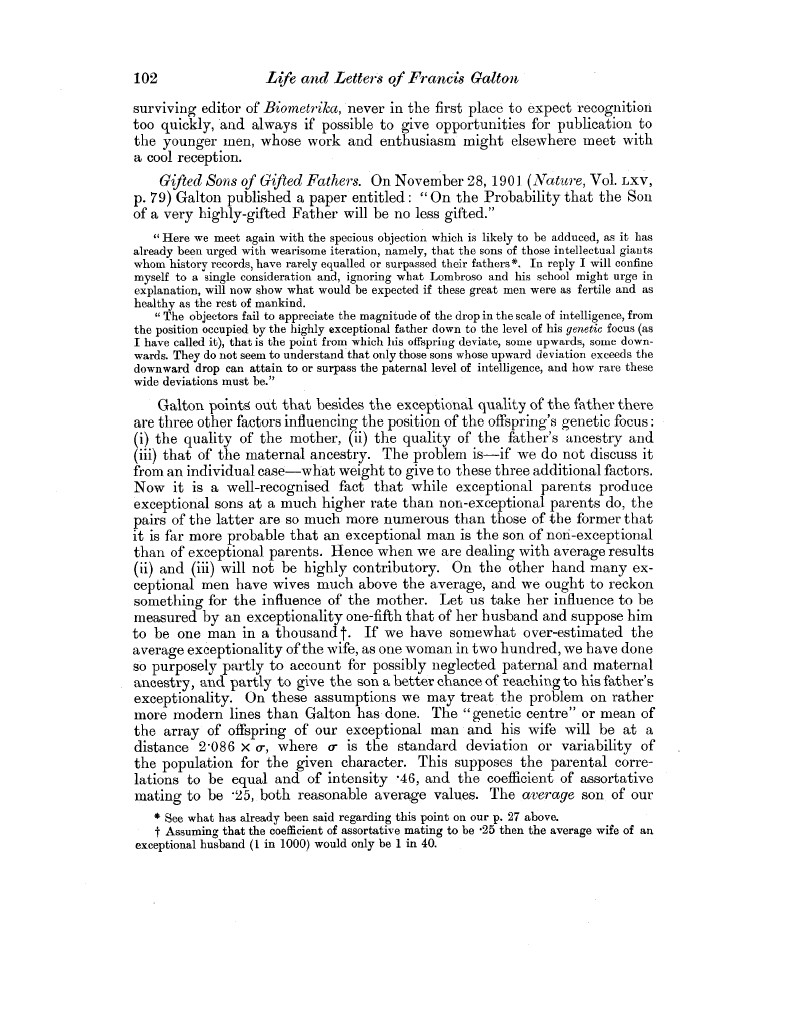| ||||||

OCR Rendition - approximate
102 Life and Letters of Francis Galton surviving editor of Biometrika, never in the first place to expect recognition too quickly, and always if possible to give opportunities for publication to the younger men, whose work and enthusiasm might elsewhere meet with a cool reception. Gifted Sons of Gifted Fathers. On November 28, 1901 (Nature, Vol. LXV, p. 79) Galton published a paper entitled : " On the Probability that the Son of a very highly-gifted Father will be no less gifted." " Here we meet again with the specious objection which is likely to be adduced, as it has already been urged with wearisome iteration, namely, that the sons of those intellectual giants whom history records, have rarely equalled or surpassed their fathers*. In reply I will confine myself to a single consideration and, ignoring what Lombroso and his school might urge in explanation, will now show what would be expected if these great men were as fertile and as healthy as the rest of mankind. " The objectors fail to appreciate the magnitude of the drop in the scale of intelligence, from the position occupied by the highly exceptional father down to the level of his genetic focus (as I have called it), that is the point from which his offspring deviate, some upwards, some downwards. They do not seem to understand that only those sons whose upward deviation exceeds the downward drop can attain to or surpass the paternal level of intelligence, and how rare these wide deviations must be." Galton points out that besides the exceptional quality of the father there are three other factors influencing the position of the offspring's genetic focus (i) the quality of the mother, (ii) the quality of the father's ancestry and (iii) that of the maternal ancestry. The problem is-if we do not discuss it from an individual case-what weight to give to these three additional factors. Now it is a well-recognised fact that while exceptional parents produce exceptional sons at a much higher rate than non-exceptional parents do, the pairs of the latter are so much more numerous than those of the former that it is far more probable that an exceptional man is the son of non-exceptional than of exceptional parents. Hence when we are dealing with average results (ii) and (iii) will not be highly contributory. On the other hand many exceptional men have wives much above the average, and we ought to reckon something for the influence of the mother. Let us take her influence to be measured by an exceptionality one-fifth that of her husband and suppose him to be one man in a thousand t. If we have somewhat over-estimated the average exceptionality of the wife, as one woman in two hundred, we have done so purposely partly to account for possibly neglected paternal and maternal ancestry, and partly to give the son a better chance of reaching to his father's exceptionality. On these assumptions we may treat the problem on rather more modern lines than Galton has done. The "genetic centre" or mean of the array of offspring of our exceptional man and his wife will be at a distance 2.086 X a-, where a is the standard deviation or variability of the population for the given character. This supposes the parental correlations to be equal and of intensity -46, and the coefficient of assortative mating to be '25, both reasonable average values. The average son of our * See what has already been said regarding this point on our p. 27 above. f Assuming that the coefficient of assortative mating to be •25 then the average wife of an exceptional husband (I in 1000) would only be 1 in 40.
|